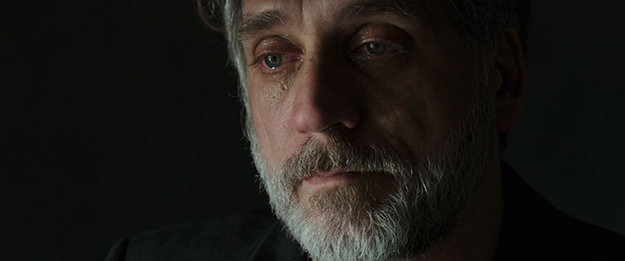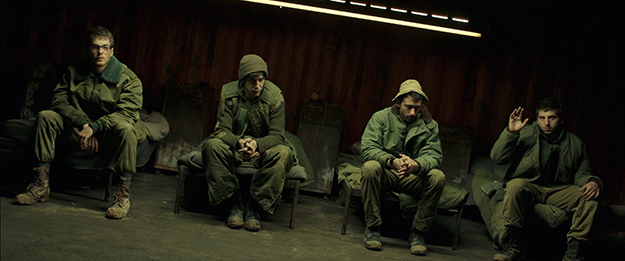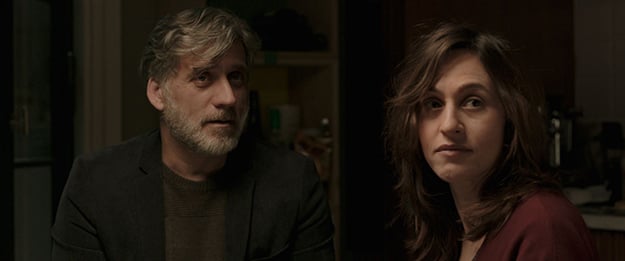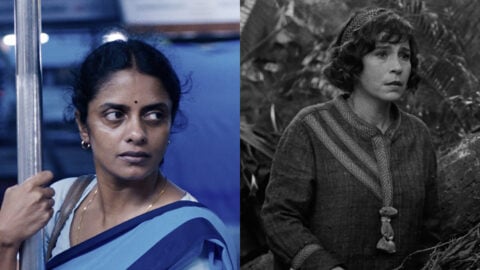Deep Focus: Foxtrot

Samuel Maoz’s marvelous, harrowing drama about death and life in Israel marches boldly through the no-man’s-land between realism and surrealism. It’s a prize collection of paradoxes, combining an intimate, eviscerating depiction of parental grief over a serviceman’s death with an empathic, absurdist rendering of young IDF soldiers manning a remote and otherworldly roadblock. The film achieves a panoramic reach with only two major locations: an elegant, chic Tel Aviv apartment and that military way station, code-named “Foxtrot,” consisting of a three-sided lookout tower, a repurposed ice cream truck, and a makeshift barracks (a shipping container!) sinking into mud. By creating a compact chronicle of a single haute-bourgeois family rooted in the Holocaust, the film dramatizes how an epic historical trauma can mingle with present-day conflicts and reverberate through generations.
Maoz sets up what appears to be a simple narrative, then deepens it every step of the way. He puts us in the shoes of the protagonist, Michael Feldman (Lior Ashkenazi), as he strives to absorb what’s happening when IDF officers come through the door with news that his son Jonathan (Yonatan Sharay) has, in accepted parlance, “fallen in the line of duty.” The soldiers act like they know exactly what to do. They quickly sedate Feldman’s wife Dafna (Sarah Adler) and, after making sure Michael drinks a glass of water, program his cell phone to remind him to stay hydrated. Every action triggers a series of troubling questions. We immediately recognize the tragic context in which notifying a mother and father of their child’s death becomes a matter of following smart protocols. The same team that knocks Dafna out with a needle appears relatively unconcerned that Michael doesn’t utter a word, though his eyes overflow with mingled fury and grief. It’s as if these strangers in uniform consider him a masculine archetype: the strong, silent man. We soon see that he’s anything but. Feldman chafes under the established routines. We can read the bitter irony in his eyes when a military rabbi advises him to prop up his wife rather than help carry the coffin, since the occasion is so difficult for women.
Foxtrot carries the excitement and punch of a fearless writer-director tackling contemporary material with a bracing cocktail of potent traditional drama, wild black comedy, and serrated style. The film splits into five sections. Two extended sequences featuring Jonathan’s parents and sister Alma (Shira Haas) sandwich a midsection that depicts Jonathan’s military service. There’s also a brief, abstract opening and a devastating coda. We eventually realize that Michael is a successful architect, which explains the cool surface of the Feldmans’ apartment, with its geometric floor pattern and jittery art. An avowed atheist and former tank commander, he’s obsessed with vagaries of fate during Israel’s never-ending state of war. He’s also the knotted-up son of an Auschwitz survivor.

Foxtrot’s Oscar-qualifying run has landed on the same week as Chanukah, but the best way I can describe the movie’s form without defusing its impact is to compare it to A Christmas Carol. In that beloved novella, Charles Dickens called his chapters “staves,” referring to the five lines that form the basis of musical notation. Each stave takes place in a separate time frame and assumes a different tone, but the recurring characters and motifs, and the heightening conflicts throughout, result in a breathtaking catharsis and achieve a symphonic whole. Maoz’s antihero, Michael, is no Scrooge, but he is an emotional miser, never coming clean about his core feeling of helplessness and refusing the assistance of those who could help him open up. His journey holds the film together; even the sections about his son illuminate the father’s torment.
What’s daringly modern about Foxtrot is that Maoz deploys contrasting techniques for his staves. In the second section, he uses supersized close-ups (like Carl Dreyer’s) and architectural compositions (like Michelangelo Antonioni’s) to achieve a raw yet conceptual power. He makes the apartment’s sleek, careful balance seem claustrophobic as he zeroes in on Michael with prolonged, intimate portraits. Ashkenazi magnetizes this imagery with his bottomless despair. And every time we think Maoz has taken too general a tack, the movie becomes engulfing, specific, and revelatory. The sound design transforms domestic sounds into assaults on Michael’s sensibility. Shortly after we hear a mysterious scraping noise, we see Michael’s dog, Max, jumping behind a pane of frosted glass and scratching at the door to get in. The dog moves toward him tentatively and flashes appraising looks as he gauges his master’s mood. It’s one of the great canine performances, culminating in an emotional whammy that also functions as an epiphany.
As Maoz invests signature props and defining actions with contrasting meanings, our hearts and minds expand to take them in. When Michael searches Jonathan’s drawer for his son’s passport, it’s filled with stuff you’d expect from a high-school grad and budding cartoonist: scissors, pens, markers, and a copy of a nudie magazine called Bellboy. But we come to learn that Michael, not Jonathan, was the real fan of this girlie rag, and his love for it sums up his fractious relationship with his strict Holocaust-survivor mother (Karin Ugowski), now beset by dementia. Here and throughout, the film toys with our perceptions.

The third stave, depicting Jonathan’s duty with a four-man guard unit that checks trucks, passenger cars, and the odd camel on a lonely desert road, plays for long stretches like a service slapstick comedy codirected by Jacques Tati and Claire Denis. Maoz has the knack for visual humor: his framing and timing put across the loopy comedy of a dromedary padding through the gate. (As a camel slowly recedes in the distance, Maoz could be parodying shots from Lawrence of Arabia.) Maoz also has the seriocomic imagination to convey afresh how badly soldiers need to escape the monotony and fatigue of their jobs. In an inspired passage, one of them demonstrates the foxtrot before he breaks into an exhilarating free-style routine that recalls the athletic Eurodance in Denis’s Beau Travail. Few contemporary films so vividly portray warfare as “boredom punctuated by moments of terror, ” a phrase dating back to World War I. The scenes of young Israeli recruits inspecting credentials capture the hair-trigger tension of their struggle to be efficient and the humiliation they visit on stopped Arab civilians. The film would be stronger if this section were even more stylized. I suspect it plays to most non-Israeli audiences as a rendering of fact, not a flight of fancy. But Maoz must be doing something right: both right-wing Israeli culture minister Miri Regev and left-wing Haaretz columnist Gideon Levy have trashed the film, Negev deriding it as “self-flagellation and cooperation with the anti-Israel narrative,” Levy condemning it for “beautifying the image of the [Israeli] state.” They’re equally wrong. The movie’s isolated failures and its overall triumph are aesthetic, not political.
The jolts keep coming in Foxtrot, and so does the intensity of the director’s original vision, even when we return to the Feldmans’ apartment in the penultimate stave. Just as these fancy digs now look untidy and off-balance (Michael has moved out), Maoz loosens his meticulous style to catch Michael and Dafna’s most spontaneous interactions as they reluctantly commune on Jonathan’s 20th birthday. (Here Maoz is more like the Bergman of The Passion of Anna than the Bergman of Persona.) Adler matches up instinctively with Ashkenazi as the couple smokes weed and relaxes into memories, then confessions. I could do without the couple’s bookend bouts of self-punishment, and Maoz leans too heavily on the symbolism of the foxtrot, a dance that leads its dancers right back to where they started. But Adler and Ashkenazi transcend the self-conscious tropes with their genuine humor and warmth. When Alma says they’re “beautiful together,” at that moment, they are.
Foxtrot comes together as a complex plea for honesty, openness, frankness, and forgiveness. The movie is also, incidentally, a spectacularly effective antiwar film, focusing on the randomness and cruelty of life lived on military roads, even at times when no guns are fired. Its final image registers like a blow to the chest. It’s a shot that should be seen around the world.
Michael Sragow is a contributing editor to Film Comment and writes its Deep Focus column. He is a member of the National Society of Film Critics and the Los Angeles Film Critics Association, and a programmer at the Criterion Collection.







